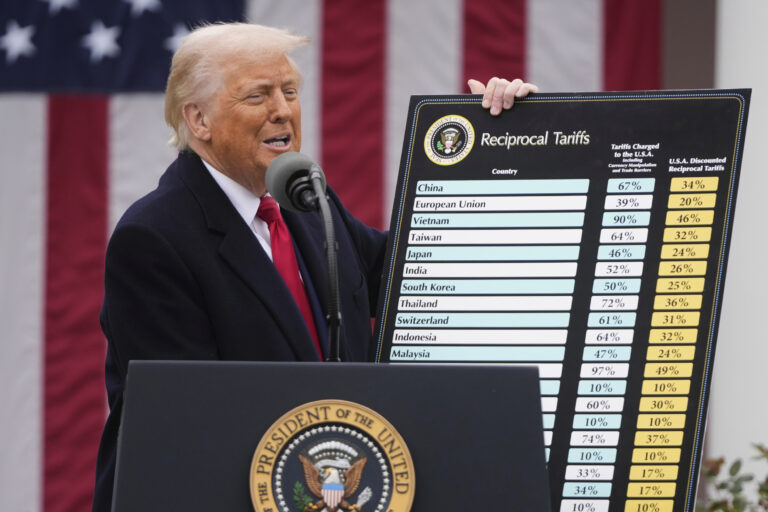Americans’ confidence in several economic indicators including the stock market and jobs market declined as Donald Trump’s implemented his tariffs policy, new polling has found.
Why It Matters
American voters are very interested in a strong economy. A Gallup poll showed that voters overwhelmingly cited economic pressures as the key reason they voted for Trump, who campaigned on reducing inflation, in the November 2024 presidential election.
But during the fledgling months of his second presidency, public confidence in Trump’s economic performance has fluctuated. Not least when—after introducing tariffs on trading partners around the world, then pausing many of the charges—markets plummeted then rebounded, and a series of polls suggested many Americans were feeling anxious about the duties and how they could impact the economy.

AP Photo/Mark Schiefelbein
What To Know
According to polling of 1,006 Americans conducted between April 1 and 14 by Gallup, several indicators of Americans’ economic mood have weakened in April in comparison to when Americans were polled in January.
When polled in January, 53 percent of people anticipated economic growth while 18 percent expected decline. The proportion of those positive about the future state of the economy has now declined to 38 percent, while 48 percent think it is likely to decline in the next six months.
The poll also found that 53 percent of Americans believe their personal finances are getting worse, the first time a majority has expressed that opinion since 2001.
Meanwhile, 58 percent expect the stock market to decline in the next six months, compared to 18 percent who thought it would go up when polled in January.
In terms of employment, 58 percent believe it is a bad time to find a job, up from 45 percent in January. This marks the most pessimistic attitude on jobs that Gallup has recorded since January 2021, during the COVID-19 pandemic.
And 42 percent of Americans believe the economy is in recession or economic depression, the poll also found, while 33 percent believe it is slowing down. But 25 percent believe the economy is growing.
However, while Gallup’s overall Economic Confidence Index stands at -22, down from -14 in December, this index is not substantially different from March, when it was at -20, and January, when it was at -19.
The poll, which has a margin of error of +/- 4 percentage points, was conducted as Trump implemented his tariff policy. He introduced a 10-percent baseline tariff against goods imported to the U.S. and “reciprocal tariffs” meaning higher levies on individual countries, which he later paused for 90 days.
Meanwhile, it is not the only poll suggesting negative attitudes to the economy are brewing. According to an April CNBC poll of 1,000 Americans, 43 percent approve of Trump’s handling of the economy and 55 percent disapprove, the first time a CNBC survey has shown the president with a net negative on the economy.
Another April poll for CBS News conducted with YouGov found that more people disapprove of Trump’s handling of the economy than those who approve, with 44 percent favorable and 56 percent disapproving of his policies.
What People Are Saying
Thomas Gift, who teaches political science at University College London, told Newsweek: “By any reasonable measure, Americans’ mood about the economy has soured. The tumbling stock market, spiking concerns about inflation, and worries about a looming, full-blown recession all play a part. Trump insists there will be long-term economic gains if voters can persevere through some short-term pain. However, polling shows clearly that Americans aren’t convinced that Trump’s plans are putting the economy on the path to prosperity. “
Jay Campbell, partner with Hart Associates, a Democratic pollster previously said: “Donald Trump was reelected specifically to improve the economy, and so far, people are not liking what they’re seeing.”
What Happens Next
Public opinion about the economy and Trump will fluctuate as his presidency continues. Whether or not Trump changes course in response to sustained backlash remains to be seen.
Meanwhile, the extent to which tariffs will be implemented after the 90-day pause is also dependent on whether countries propose more favorable trade agreements with the U.S., the administration has said.


